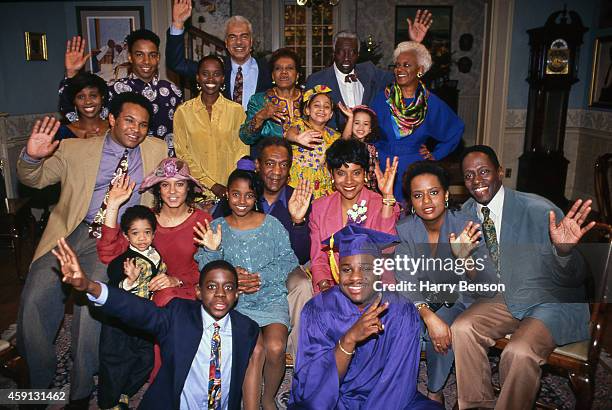
Introduction
When The Cosby Show first aired in 1984, it quickly became a revolutionary force in television. It didn’t just entertain—it changed the landscape of sitcoms forever. The groundbreaking show introduced audiences to the Huxtable family, an upper-middle-class African-American family who lived in Brooklyn. At a time when African-American families were rarely depicted on primetime television in such a positive light, The Cosby Show became a cultural phenomenon that would influence TV for decades to come.
In this article, we’ll explore how The Cosby Show broke down barriers, redefined family life on television, and remains one of the most influential sitcoms of all time.
1. Breaking New Ground in Family Sitcoms
Before The Cosby Show, most American sitcoms followed a very specific formula: a white, nuclear family, often dealing with humorous situations that were somewhat disconnected from real-life issues. The rare depictions of African-American families were often stereotypical or relegated to supporting roles. However, The Cosby Show turned this norm on its head by portraying a Black family in a loving, intelligent, and successful light.
At the heart of the show was Dr. Heathcliff Huxtable (Bill Cosby), an obstetrician, and his wife, Clair (Phylicia Rashad), a lawyer. The Huxtables weren’t just “getting by”; they were thriving. They had a beautiful home, successful careers, and were raising five children with humor, wisdom, and compassion. This was something television had never seen before: an African-American family depicted as the model for the American dream.
The show’s writers intentionally avoided racial tropes and instead focused on universal themes of family life, making it accessible to viewers of all backgrounds. The Cosby Show didn’t just represent African-American life—it celebrated it.
2. The Cosby Family: A Model of Unity and Humor
What set The Cosby Show apart from other sitcoms wasn’t just the portrayal of a successful Black family—it was the chemistry between the characters, especially Bill Cosby and Phylicia Rashad. Their on-screen relationship as Dr. Huxtable and Clair Huxtable felt real and relatable, but also aspirational. The pair played a loving, funny, and occasionally tough couple who always put family first.
The Huxtable children—Denise, Theo, Vanessa, Rudy, and Sondra—were written with depth and complexity, each going through their own struggles and triumphs. Theo, the middle child, often served as the audience’s entry point into the family’s dynamic. His struggles with school and self-esteem were depicted in ways that resonated with millions of viewers, particularly those from similar backgrounds.
The show was also known for its light-hearted approach to addressing tough issues like adolescence, sibling rivalry, and growing pains. While it had its fair share of laughs, The Cosby Show tackled these topics with care and humor, often leaving viewers with a valuable lesson by the end of each episode.
3. The Show’s Impact on African-American Representation
Before The Cosby Show, mainstream television had a history of relegating Black characters to side roles or stereotypes. But through the Huxtables, The Cosby Show broke new ground, giving the African-American community a positive, relatable, and multifaceted portrayal on television. It showed that Black families could be educated, successful, and loving without being reduced to caricatures.
This breakthrough had a ripple effect across the entertainment industry. Shows like A Different World (a spin-off of The Cosby Show), Family Matters, and The Fresh Prince of Bel-Air followed in the footsteps of The Cosby Show, expanding the range of African-American representation on television. In this way, The Cosby Show opened doors for countless future Black actors, producers, and writers.
4. What We Can Still Learn From The Cosby Show Today
While many things have changed since The Cosby Show first aired, its themes remain relevant. The portrayal of strong family dynamics, the importance of education, and the value of working hard to achieve your dreams are lessons that continue to resonate. The Huxtables may have lived in a world of privilege, but their values and approach to family life still strike a chord with audiences today.
In a world where family dynamics are often complex and fractured, The Cosby Show remains a reminder of the power of unity and love. Though it’s been decades since the show aired, its lessons still hold weight.
Conclusion
The Cosby Show didn’t just change the way we view television families—it redefined what was possible in sitcoms. By showing a Black family in a positive, relatable, and aspirational light, it opened doors for diverse storytelling and representation. Today, The Cosby Show remains a beloved piece of television history, continuing to influence the portrayal of family life and African-American experiences in media.
